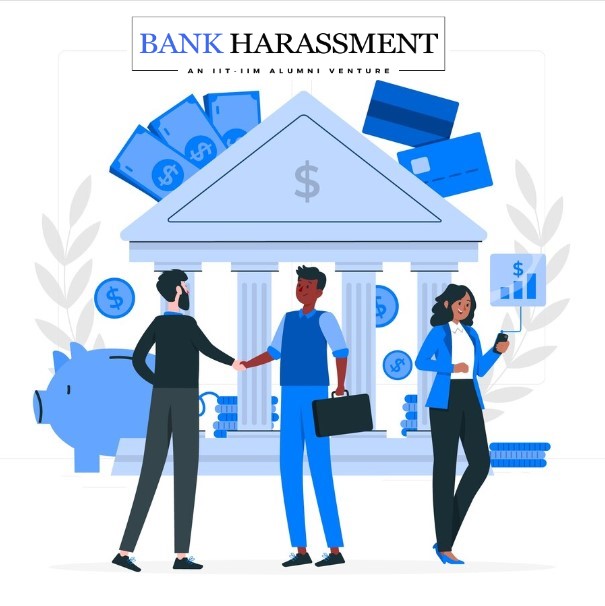Life after graduation often begins with the heavy burden of education loan EMIs. For many, this financial stress is severely compounded by the aggressive, often illegal, tactics of recovery agents – a pervasive form of bank harassment. If you’re a recent graduate struggling with repayments and enduring this harassment, understanding your options, particularly education loan settlement, is crucial.
At Bank Harassment, we don’t just help you understand the RBI Guidelines for loan settlement; we empower you to use them to end debt stress and, most importantly, stop the harassment.
Education Loan Defaults: When the EMI Stops, the Harassment Starts
When you miss your education loan EMIs, Indian banks follow a structured recovery process that, unfortunately, often involves the escalation of bank harassment:
- Initial Reminders (1-30 days overdue): You’ll get calls and messages. This is often the beginning of frequent contact that can quickly feel overwhelming.
- Increased Follow-up & Rising Harassment (30-90 days overdue): Calls intensify. The bank might offer deferment, but if you don’t respond or can’t comply, the tone often shifts. This is when aggressive tactics from recovery agents, driven by collection targets, typically begin. They might call repeatedly, use firm language, or even try to contact your family or workplace – all forms of bank harassment that violate RBI Guidelines.
- Non-Performing Asset (NPA) Classification (90+ days overdue): Your loan is classified as an NPA, severely impacting your credit score. The bank’s internal recovery efforts, often involving external recovery agencies, become relentless. The harassment from these agents often becomes more direct and intimidating.
- Legal Action & Write-Off (180+ days overdue, onwards): If harassment and other recovery efforts fail, the bank may serve a legal notice, threatening civil suits or other legal proceedings. While this happens, the harassment often continues. After a prolonged period (sometimes 2-3 years), banks might “write off” the loan from their books, but the debt remains, and the harassment won’t necessarily stop until a proper loan settlement is reached.
Education Loan Settlement Rules by Indian Banks: Your Path to Ending Harassment
While no single government scheme dictates every education loan settlement, Indian banks operate under broad RBI Guidelines that permit “compromise settlements” or “One-Time Settlements (OTS).” These are crucial pathways to not only resolve your debt but also to legally stop bank harassment.
Here’s what generally applies:
-
Eligibility for Settlement (and Ending Harassment):
- Loan in Significant Default: Your education loan must be an NPA (90+ days overdue). The longer the default, the more likely the bank is to consider a loan settlement, as they are keen to close the account and stop incurring further losses. This also provides you leverage to negotiate an end to the harassment.
- Demonstrated Financial Hardship: You must prove you genuinely cannot repay the full loan due to unemployment, underemployment, or other severe financial distress.
- Exclusion of Wilful Defaulters/Fraud: While RBI Guidelines generally exclude these cases, a genuine financial hardship is the key differentiator.
-
The Negotiation Process (to Secure Peace):
- Initiation: You can initiate the negotiation. Having experts on your side, like Bank Harassment, can significantly improve the outcome and ensure harassment ceases during the process.
- Offer Presentation: You propose a lump sum. Banks consider the outstanding amount, your financial situation, and the age of the default. This is where skilled negotiation can maximize your waiver and ensure clear terms for ending all collection efforts.
- Waiver: A loan settlement means the bank waives a portion of the principal, interest, and penalties. The waiver percentage depends on various factors, but securing it definitively ends the debt, and thus, the harassment.
-
RBI Guidelines on One-Time Settlement (OTS):
- The RBI mandates that banks have board-approved policies for compromise settlements, especially for NPAs. These guidelines promote fairness and transparency.
- Crucially, when a settlement is reached, the basis for continued collection calls and harassment is removed. The RBI Guidelines explicitly prohibit harassment, and a final settlement ensures compliance with these rules.
-
The “Settled” Status and Credit Score Impact (and the Trade-off for Peace):
- Yes, an education loan settlement will impact your credit score, marking the loan as “settled” (not “paid in full”). This mark stays for several years (typically 7).
- However, consider the alternative: prolonged default means continuous credit score degradation plus ongoing bank harassment, which takes a severe toll on your mental and physical health. A settlement, while impacting credit, provides definitive closure and stops the harassment, allowing you to focus on rebuilding your life and credit score in peace.
-
Documentation is Your Shield Against Harassment:
- Always get the loan settlement agreement in writing. It must explicitly state the agreed-upon amount, the payment deadline, and, most importantly, that upon payment, the loan is “full and final settled” and all collection activities and future claims are waived.
- After payment, obtain a “No Dues Certificate” (NDC). These documents are your legal proof to counter any future, illegal harassment attempts.
How Bank Harassment Guides Your Education Loan Settlement & Provides Anti-Harassment Service
Understanding complex RBI Guidelines and dealing with aggressive recovery agents while under financial stress is incredibly difficult. Bank Harassment offers comprehensive support:
- Aggressive Anti-Harassment Service: Our primary focus is to stop the harassment immediately. We intervene, take over communication, and ensure your rights under RBI Guidelines are upheld, shielding you from abusive calls and threats.
- Eligibility & Legal Compliance: We assess your case based on current RBI Guidelines and bank policies to determine the best path for your education loan settlement.
- Strategic Loan Settlement Negotiation: Our experts negotiate directly with banks on your behalf, aiming for the maximum possible waiver and ensuring the settlement terms explicitly guarantee the cessation of all collection efforts and harassment.
- Protection from Legal Notices: We help you understand and respond to any legal notices, guiding you through the settlement process to legally resolve the debt and prevent further escalation.
- Credit Rebuilding Guidance: Post-settlement, we provide a clear roadmap for improving your credit score, helping you regain financial stability and peace of mind.
Don’t let a defaulted education loan and relentless bank harassment control your life. Understanding the rules for education loan settlement and having expert support empowers you to take control. Contact Bank Harassment today for a confidential consultation. Let us help you settle your education loan and secure your future, free from debt and harassment.



